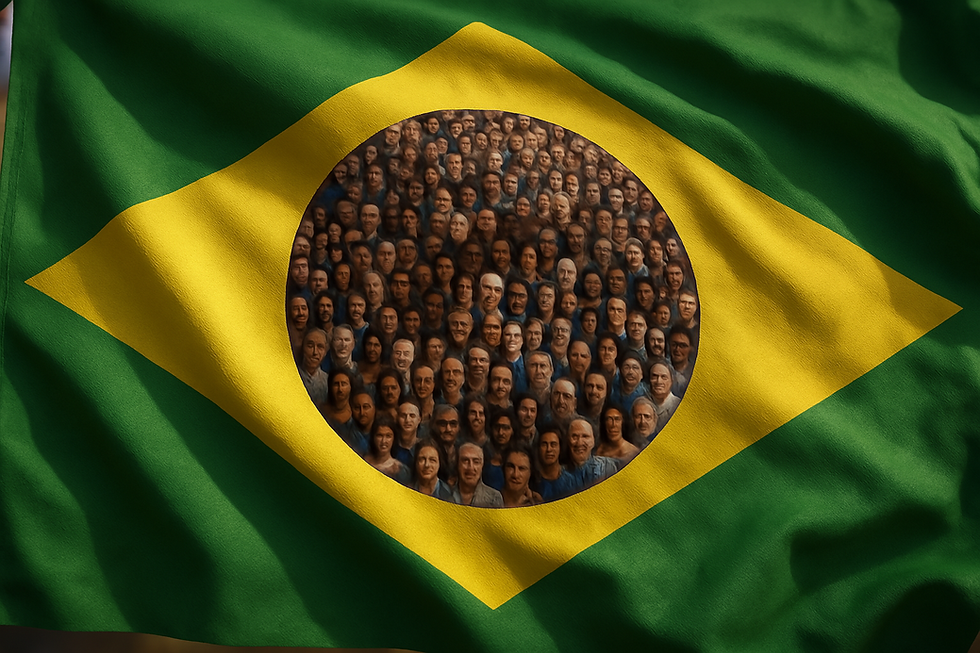A Call to Uphold Constitutional Democracy
- Misael Alexis de Moraes

- Aug 5, 2025
- 4 min read

In light of the massive popular demonstrations that took place on August 3, 2025, even though one may not fully agree with every speech delivered by civil society leaders or legitimately constituted political representatives—not to mention any explicitly stated political or electoral objectives—it is necessary to acknowledge that the Nation demonstrates growing legal consciousness and political maturity.
It is hard to imagine that a father of a family, on what is likely his only day of rest, would leave his home to exercise his citizenship in a public demonstration if he did not perceive genuine relevance or concrete cause for legitimate concern. The Brazilian people are part of a politically aware and intellectually engaged society, one that knows and demands the rights guaranteed by the Constitution, such as suffrage and freedom of peaceful assembly, independent of state permission.
Personally, as a lawyer and citizen, I have serious doubts about the genuine necessity of the degree of prominence currently assumed by the Federal Supreme Court—both in the domestic political arena and in external projections. Historically, the institutional value of the STF has resided in the excellence of its jurists, the prudence of its actions, and the impartiality of its decisions, all firmly grounded in high-level legal scholarship.
The Supreme Court’s focus should be on the technical quality of its deliberations—an objective standard assured, above all, by its collegiate composition and the observance of republican principles that govern constitutional magistracy.
Freedom of expression, private enterprise, and legal certainty—essential pillars of liberal democracy—are being relativized under the guise of combating “extremism,” often resulting in criminalizing dissent, silencing dissonant voices, and stifling democratic debate.
It is time to reaffirm republican boundaries. This is not a call to attack the Judiciary, but rather to reaffirm its proper constitutional role: to act as an impartial arbiter, not as a partisan actor in political or ideological disputes.
This is a manifesto in defense of a true Democratic Rule of Law—a state that respects popular vote, pluralism of ideas, free competition, and due process. It is a state that does not allow the concentration of power in any institution, however well-intentioned its actions may seem.
On the other hand, in the spirit of the impartiality this manifesto seeks to uphold, a respectful appeal is made to Brazilian political actors based in Washington, D.C., to respect the sovereignty of Brazilian democracy and refrain from measures that might unnecessarily escalate the ongoing institutional crisis. While concerns for universal democratic principles are understandable, a nation’s autonomy is not built by external imposition of sanctions or by applying solutions outside its own political process.
When one calls for sanctions against public agents from another country, the response may be disproportionate to the grievance itself. Moreover, the geopolitical power and influence of the United States demand proportional responsibility, prudence, and respect for the self-determination of peoples. Recent history has shown that poorly calibrated external interventions tend to worsen institutional wounds rather than heal them.
Any external sanction must arise organically from foreign or international law—not from domestic actors urging hostility toward their own country. Brazilian political leaders should refrain from encouraging any form of foreign pressure, as the remedy may harm the very republic whose ailments they aim to address.
I do not believe, for a moment, that Brazil has exhausted its internal institutional capabilities. On the contrary, there remains ample room for legitimate popular sovereignty to be exercised through Parliament, with the aim of strengthening the balance among the Powers. Within the constitutional framework, it is fully possible to approve objective limits on the Supreme Court’s monocratic decisions, restrict indiscriminate use of procedural secrecy, clarify the rules around privileged jurisdiction, and even introduce the judge of guarantees within the Supreme Court itself as a safeguard for fundamental rights.
We can also seriously entertain proposals such as converting life-tenured positions into fixed terms of up to twelve years to ensure institutional renewal; enhancing the Senate’s confirmation process with more rigorous standards for legal distinction and integrity—far beyond mere formalities. There is also space to fortify the impartial function of the President of the Chamber and Senate by enacting rules that secure transparency and collegiality in agenda-setting, particularly for matters of national importance such as impeachment and investigative commissions. We must not allow these two officers to effectively block the start of any investigation.
In sum, Brazil does not lack external intervention—it lacks internal courage, civic vigilance, and reformist political will aligned with constitutional principles that uphold democracy as a continuous and intergenerational project.
The republic’s distortions must be confronted, debated, and corrected within the legitimate deliberative institutions of the nation—especially the Chamber of Deputies and the Federal Senate, where democratic representation truly resides. It is there that the intellectual, legal, and strategic acumen of our representatives must flourish—not under the shadow of foreign pressures.
Therefore, we call upon civil society, conscientious jurists, legislators, and all defenders of liberal democracy to act with determination. We must restore balance among the Powers, check excesses, and reaffirm that in a mature democracy no power is absolute—not even the Judiciary.
Justice, more than an institution, is a profound expression of love for others and social empathy. And to us, lawyers—indispensable to its realization—belongs not only the technical craft but also the noble duty of cultivating a critical, clear-sighted legal mindset committed to human dignity and the Rule of Law


Comments